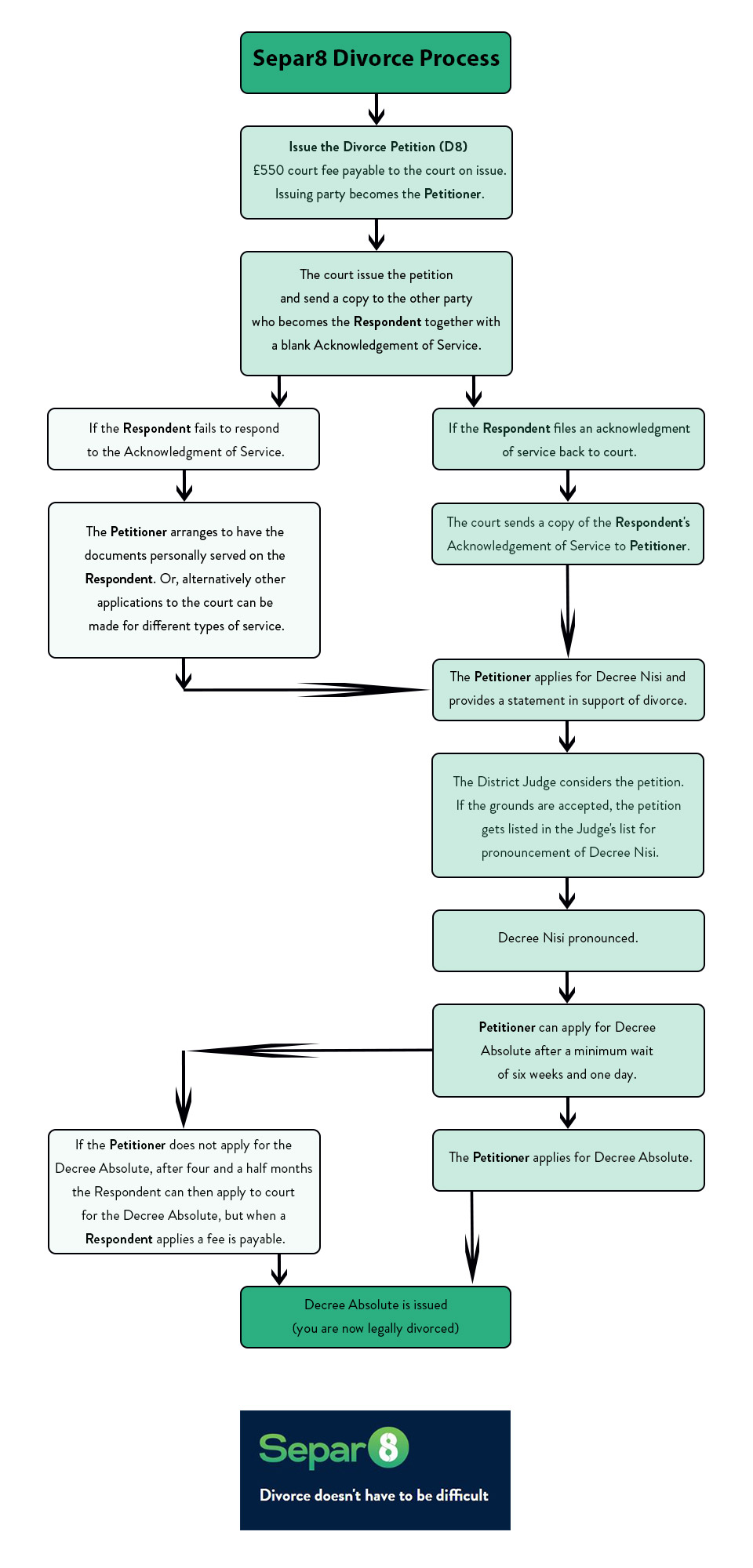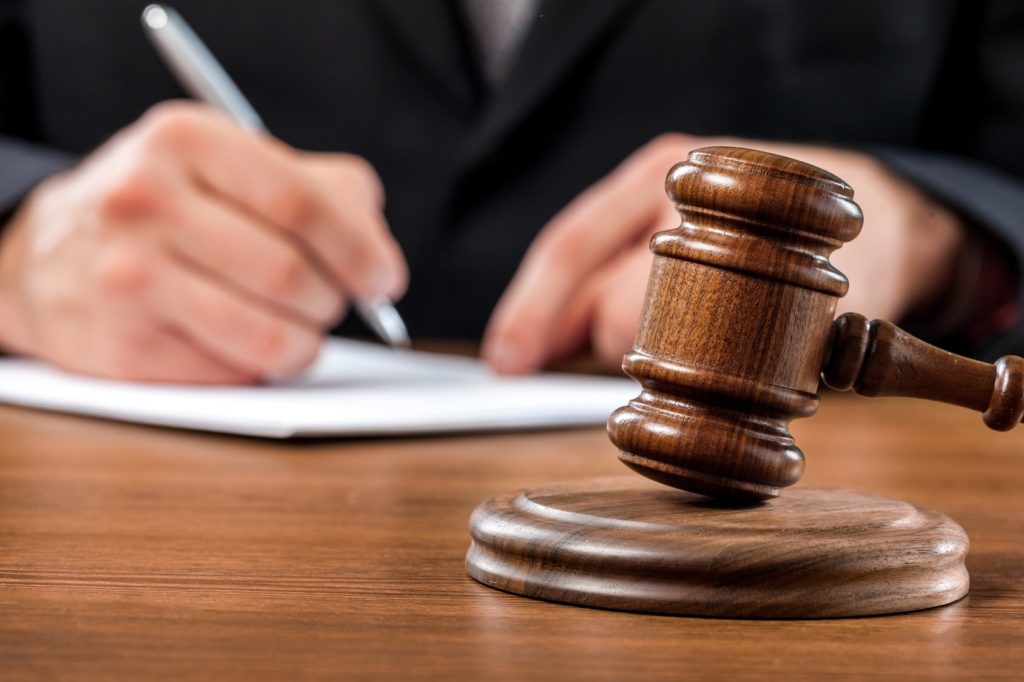When it comes to the breakdown of a marriage, the prospect of issuing divorce proceedings can be a very daunting experience.
Most people don’t know where to start, so Separ8 have created this simple guide to help.

Fortunately, almost all divorce proceedings issued by the court each year are not contested by the other party and so the proceedings can be progressed to a conclusion without difficulty.
If both parties agree in principle with the divorce and the reasons for the divorce, then proceedings can be finalised within 4 to 6 months; sometimes even quicker if you instruct Separ8 to handle the divorce for you.
Divorce does not need to be difficult or expensive, and it is entirely possible for individuals to deal with the proceedings in person. However, please be aware that the court cannot provide legal advice or suggest which options are best. The court personnel simply process the papers through the court. For that reason, we would recommend that you instruct Separ8 to handle the case for you for a low fixed fee cost.
We are always happy to provide initial assistance to individuals considering issuing divorce proceedings themselves during our free 30-minute consultation call.
The Divorce Process

What Are The Grounds For Starting Divorce Proceedings?
Although there is actually only one ‘ground’ for divorce, which is that the marriage has irretrievably broken down, that ground must be proven to the court by establishing one of the five following facts:
- Adultery
- Unreasonable Behaviour
- Separation of 2 years with the consent of the other party
- Separation of 5 years – no consent required
- Desertion
1. File A Divorce Petition
Having decided on the appropriate reason to support the ground of irretrievable breakdown of the marriage, the issuing party must file a completed and signed divorce petition with a regional divorce centre of the court.
Note that the divorce petition must set out the reason for the divorce (why the marriage has broken down) and provide some particulars in support of that reason.
At this stage the petitioner also needs to pay the court fee of £550.00 (unless the petitioner is on a low-income or receives certain benefits, in which case the petitioner may be entitled to exemption from the court fee).
When submitting the divorce petition, the petitioner must provide the court with the original marriage certificate. If the parties were married abroad, then the certificate must be translated into English before divorce proceedings can commence. Note that if you do not hold your original marriage certificate then you will need to apply to the local registry office for an official certified copy.
The divorce petition is the main document in the divorce process, and it is therefore essential that it is completed correctly.
2. Acknowledgement Of Service
The second stage of the divorce proceedings involves the court sending a copy of the divorce petition to the other spouse with an acknowledgement of service form that they need to complete and return to the court within 7 days.
The acknowledgement of service form confirms to the court that:
- Your spouse has received the divorce papers
- They are happy with the reasons for divorce, and the wording used
- Whether they agree to the divorce or want to defend it
The court will not chase the other party if they do not complete the acknowledgement of service within 7 days and so the petitioner will need to take further action if the acknowledgement is not returned. That usually involves instructing a court bailiff or a process server, who will personally hand the divorce petition to the respondent. This step is essential if the proceedings are to continue and it does attract a further cost of between £100 and £150.
3. Decree Nisi
Once the acknowledgement of service has been returned, the petitioner can apply for the decree nisi (the first decree), which is when the District Judge will consider the petition and associated documents and satisfies him / herself that there is no good reason why the petitioner should not be granted a decree of divorce.
If the judge is satisfied that there is no reason why the divorce cannot go ahead, then a Certificate of Entitlement to a Decree will be issued, which sets out the date for pronouncement of the decree nisi.
After the decree nisi has been pronounced then the petitioner can apply for the final decree six weeks and one day later.
Note: It is not always advisable to apply for decree absolute at the earliest opportunity. We would always recommend a petitioner to check their position with a solicitor at Separ8 before applying for decree absolute.
4. Application For Decree Absolute
The final step in the divorce process is to apply for the decree absolute, which is the final decree and is what legally finalises the divorce.
As we stated above, the application for the decree absolute cannot be presented earlier than six weeks and one day of the decree nisi pronouncement date.
An application for the decree absolute typically takes 7-14 days which will then formally and legally end the marriage.
Important Note: A divorce does not address the issue of financial arrangements between the parties. Financial claims by one party against the other remain open indefinitely (even after divorce) until those claims are formally ended by a “clean break” financial order (often referred to a consent order).
We would strongly recommend that you take advice from one of our solicitors regarding financial arrangements even if you represent your own interests in the divorce proceedings. Our 30-minute free consultation can be used for this purpose.

What Do The Court Charge For Issuing The Petitioner And Dealing With The Divorce Proceedings?
Court fees for divorce proceedings are set by the government; these are currently £550.
In some instances, a petitioner may not have to pay the court fee, typically if the petitioner is in receipt of one or more of the following benefits:
- Jobseeker’s Allowance (JSA)
- Employment and Support Allowance (ESA)
- Income Support
- Universal Credit
- Pension Credit (Guarantee Credit)
The Benefits Of Instructing Separ8
Whilst you may feel comfortable in dealing with the divorce proceedings without using a solicitor, many people prefer to use a divorce expert to handle the proceedings for them.
Divorce proceedings are usually straightforward and need not be expensive. Unless the petitioner qualifies for fee exemption the court fee of £550.00 will apply whether or not you choose to instruct a solicitor.
At Separ8 we charge a fixed fee of only £299.00 (including VAT) to handle the divorce proceedings from start to finish. We are specialist family law solicitors, so you can be assured that your case will be handled by an expert. We never compromise on quality of service.
Remember, if you are not quite sure about whether to handle the case yourself or indeed whether you are ready to start proceedings then feel free to arrange your 30-minute free consultation and we will happily advise you regarding your best options.
Book your free consultation now. We are always here to help!
